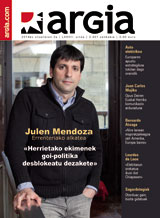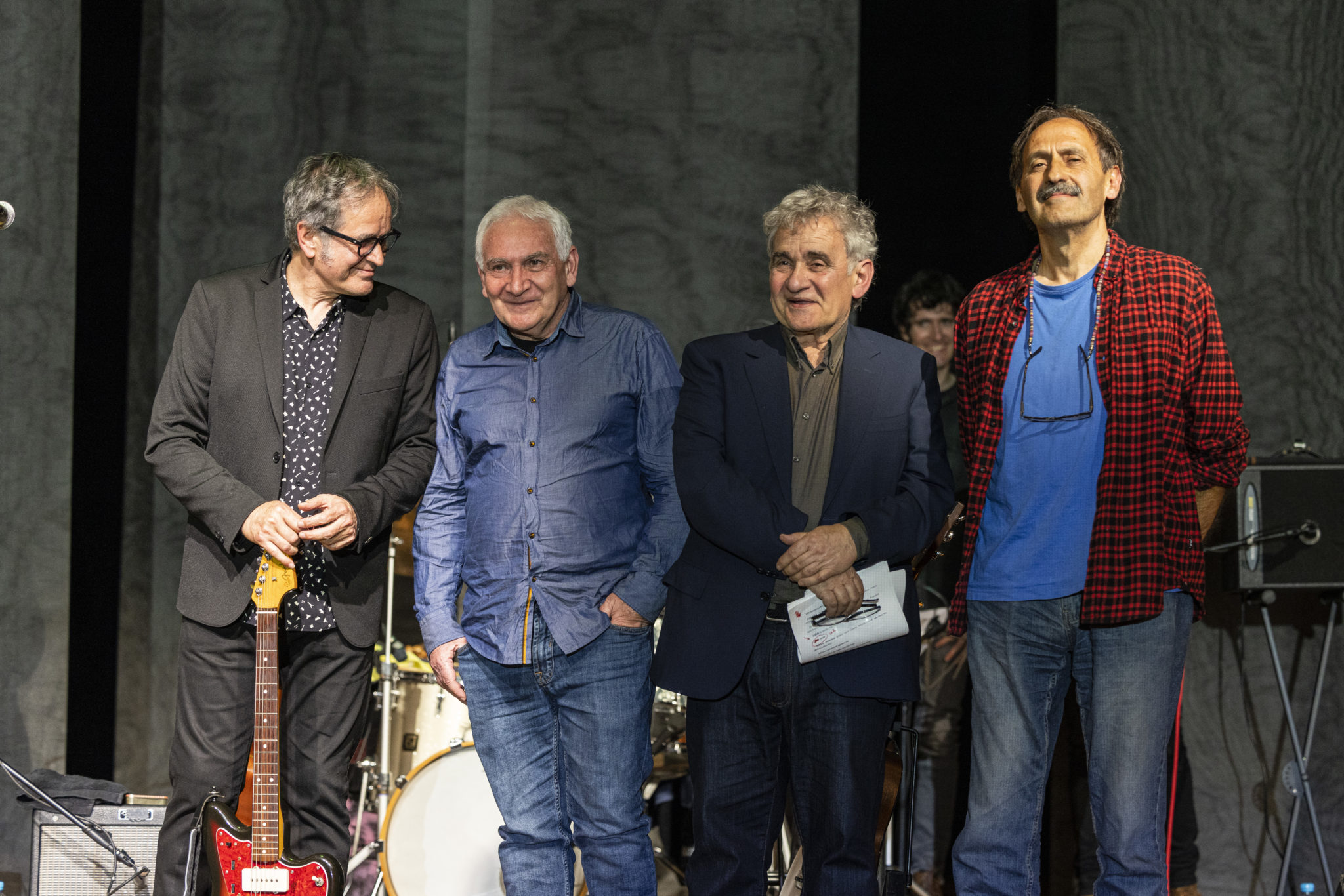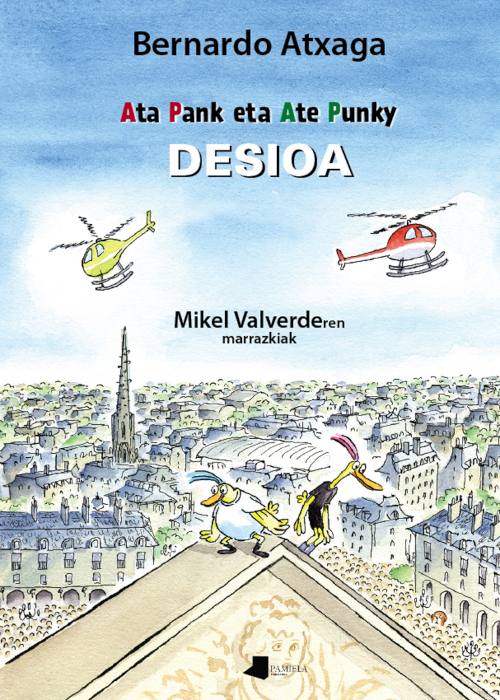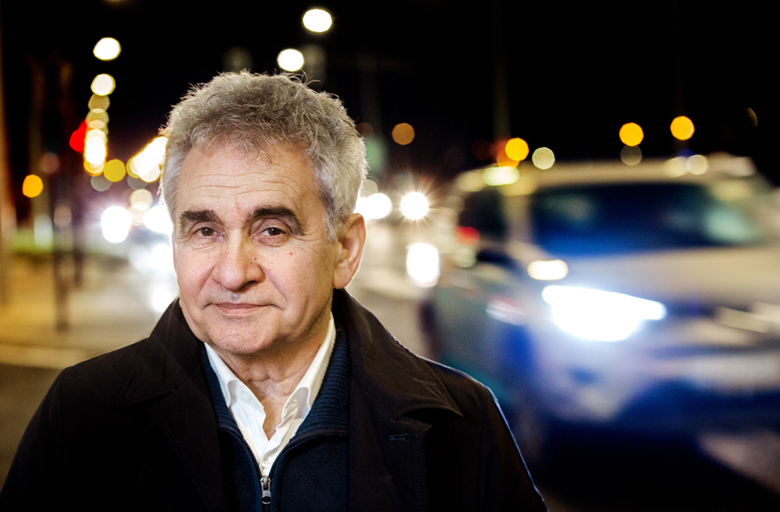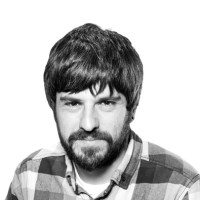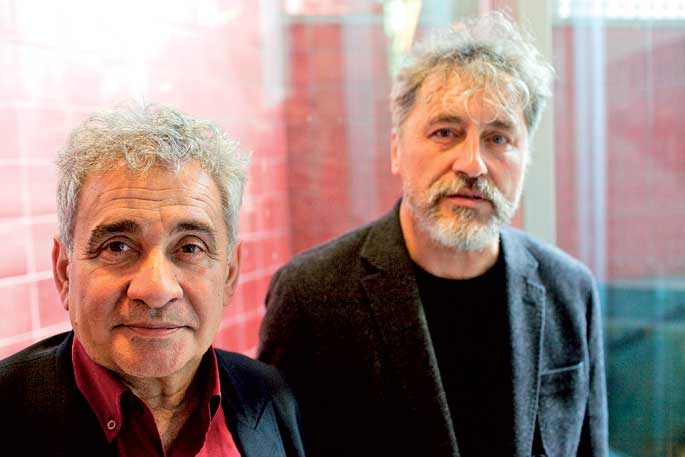"Nevada inside is the one that has the most strength in this book."
- Bernardo Atxaga has published a new novel. It's a novel that breaks with the classic characteristics of the genre. Nevada Day (Pamiela, 2013) is full of elements and although the title of the work highlights the chronicle, the book is a reflection, a memory, a biography, a story and a narrative. The author has surprisingly united various elements, leaving rhetoric and always seeking truth and beauty. Once again, the author has taught us the craft of writing looking at the inner world of the human being.
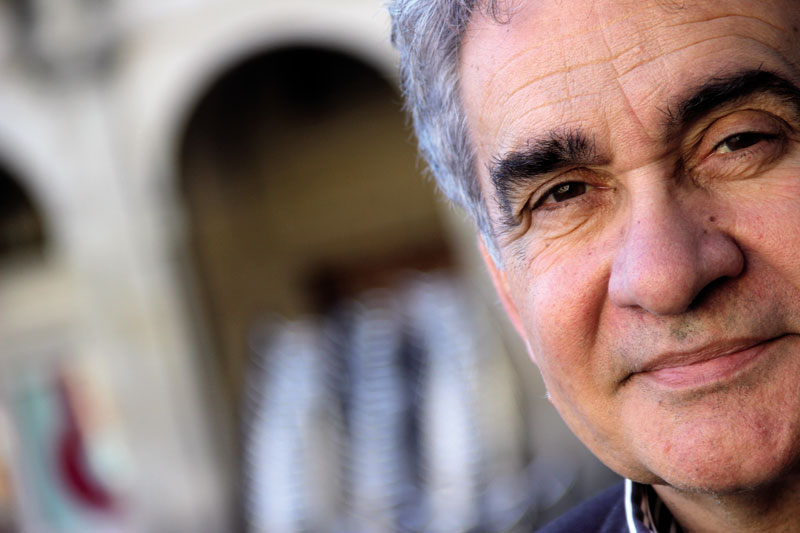
In Nevada, you were in Reno with your family in the 2007-2008 William A. Douglass Visiting Scholar – researcher or expert visitor – through the program. I had a one-year stay and, as you can see, I wanted to write, to pick up what I would see…
It's something that comes with age. Evidently, it goes without saying that, after a person turns 60, he has that warehouse, so much life experience… Too much for our body! I remember what I was told at the hospital: “We have inherited from our ancestors a 40-year-old body. Everything else is a gift.” When they told me that, I thought that age was too old, not just for the body, but maybe also for the mind. I have the impression that I put my hand in the bag of a 60-year-old and I can find something in him, a real bazaar. To that, on the other hand, I not only have life experience, but also a lot of writer’s experience… Well, I put that pasta in the oven and I’ve made bread. I've been thinking for a long time, and I think I have to make a book of poems, or a poetic work, to gather that experience. Meanwhile, I've written the days of Nevada. It's a post, after 60 years, my first book. Maybe there are others.
There's life experience, there's writer experience. Along with this, there is a memory, a reflection, a biography, and there is a chronicle of your life in Nevada…
The first experience, though, is what I did when I wrote the Obabakoak. So I went to Villamediana. All of a sudden I went to a small village in Castile. I walked in and didn't go out for nine months. I also spent nine months in Nevada! Right now I realize it!.. That is also learned: to leave behind domesticated domestic mirrors and suddenly to have in front of undomesticated mirrors, that is, landscape and unknown people. It's a start again. In Villamediana, I made my first experience of this kind. I did so by following the situationism theory, after reading the theories of aesthetic anarchism: “Put yourself in a place where it’s not yours. Are you from Paris? OK, but don't get out of the street you spend every day. Go from the other and tell me what you see, the impression you get.” The new impression that comes from the outside greatly influences your interior landscape. It's a ping pong game, so to speak. The landscape returns the ball and you have to think about it.
That is the job of a writer. To correctly collect the powders that this new landscape has raised in the heart of the writer…
The simplest literary solution would be to do everyday, or chronic, or dietetic. But that, for example, I forbid myself: I hate the disciples. As a reader, I don't like anything in general. In France, for example, many diets have been made. “Karnetas,” they say there. I read Albert Camus's cards. You can't compare it to the force you have in the novels. I refused to do the diet. My effort – and I also said this in the presentation – has been to do something organic, to build a building, to collect pieces, and not to put them mechanically. I didn't just want to make a mosaic, I wanted to relate everything. That’s what I mean when I say “organic”, something full of yarn… We could try. Take a text from the book, take another one, and we would see that underneath there are links, everything is filled with threads. Take a plant out of the ground and it's full of veins, with all veins attached. That's the organic, that's the book.
You have given importance to that, to José Francisco and to other characters of the same kind, let’s say…
Because diets and things are never at the top of meaning. They never say everything a book can say. The form is limited. In order not to have those limits, I had to take the forms of the novel, the characters had to take strength, they shouldn't just be chroniclers. As a result, all the characters had to have a kind of backyard, a kind of bottom, an interior, a few ghosts. And the question is then, from the point of view of truth and beauty, who is more important, the ghostly world inside or the outside world? I think it's clear, without the fantastic world inside of us there's no truth, there's no beauty, at least on a large scale.
In the characters in the book, of course, some have more strength than others. The strongest character, the narrator, Joseba Irazu, who has been shown as ever: fragile, intimidated, concerned… Fragility,
fear, anguish… are always very present in our lives. They may not have to appear in a conversation, but that's what literature is for, the way, because it's a way of saying some truths. I've thought a lot about it, looking for what, from our particularity, will be true for others. The fight against rhetoric is ongoing, for me. Rhetoric approaches our life, they throw it on our plate as if it were a salsa… Rhetoric is very bad, it is a lie, it goes back and gets worse to understand the subject, to approach us, the moment. I have very strict examples...
For example?
I will say that with all respect. Let me see if I can say it right. The other time was the final of the bertsolaris championship, and I went on. There are people with a lot of talent who have a great gift with words, but I have doubts about the concept. When they put a subject to whom he would win – or the son who had killed his father in the attack – and sang suddenly about it, his answer proved that there was a tremendous problem in the concept. Maybe he sang, where he was, in front of those thirteen thousand friends, and normally because he was in front of people of a certain ideology, but I, out of all rhetoric, must say that what he said was not conceptually acceptable, could not be universal, could not be eternal. Experience tells us that this pain, the pain of that child whose father has been killed, is not overcome. There are no words there. It may not be said in front of thirteen thousand people, but it has to be said in a book. I believe that if Amets Arzallus also writes a book, he will have to put it in a different way. I do so with all respect.
In the book Nevada Days, some of the characters have real names and surnames. Monique Laxalt, suppose. Others, on the other hand, no. Bob Earle, for example, William A. A very rich character of Douglass. Why that difference?
Very good question.
Even one.
Very good question. Why do some have a real name and others don't? There are characters that have a very different weight in the book. Those who have less weight, that is, those who are part of the chronicle, like Gabriel Urza Laxalt… the piece that I am going to erase in the translation, by the way, have real names and surnames. Those characters serve me to make a chronicle, to talk about the landscape, about Laxalt, about Barack Obama, about bears and everything else. In the chronicle, I have written his words without any other effort, that is, I do not enter into his fantastic world… The case of Bob Earl is different. His weight in the novel is extraordinary, it can't be Bill Douglass, either by name or by name. It's true that Bill Douglass is, in a way, behind this character, but he's like that physiology professor [Joseph Bell, Conan Doyle's professor of medicine] was behind Sherlock Holmes. For a character to be important, the writer has to play with what he sees and what he doesn't see. With the inner world, more than with the outside world. So I couldn't make Bill Douglass the character of the novel, because I don't know her so much. In general, we don't know the inner world of the person next to us. No one. Another truth that is learned at the age of 60 is that the phenomenon of consciousness is an ultra-challenging phenomenon. No one can guess what are the paths of the consciousness of who is next to them. They're infinite. I compare consciousness with the image of a galaxy, so many masses and so many stories… And as I cannot give depth to that, and on the contrary, as it needs depth, I have to resort to fiction, and in fiction, in my opinion, the truth is explained more than in the chronicle, with the depth it needs... And from there, another question: Who has the most cargo, Bob Earl, or José Francisco? Bob Earl or Adrián? I think that Adrián and José Francisco have a lot more load, they are much more interior… The question is good, because I have also had to think. Characters who are in the line of the chronicle, with their name. Those in the line of the novel – Dennis, Bob Earle, or neroni…–, otherwise.
Will all those who have walked through Nevada and have not walked through the earth do the same reading?
This question is also fine. I'm going to talk in general. One of the problems that Basque literature will have in the short term – I will say this as a prophet – will be the distance. I mean, what a joy for us, at university, to read the poems of the Chinese poet Li Po. Or Dostoievsky, which I read during school. It was a great pleasure to read them. In the distance, in the distance, there was and there is a poetics. The lack of distance will cost the literature written in Basque. It loses a poetic component. “There is no genius for the servant,” the saying goes. Likewise, “there is no poetry for lovers in the writer of Amurrio”. They will tell me yes, but I say no. In this sense, when the book is read by those who have not been in Nevada, they will have more amplitude. I would dare to say that they will read it better. The question or concern of everyone present will always be as follows: “Such a house, it will be her. Such a character, that other.” As for the elements of Nevada, that's how it will work.
Is it only my conviction that it has done some of the most beautiful jobs in the United States? The lesson of Harako Greenland, Seven Houses in France – partly written in America – these days of Nevada…
Ha, ha, ha… America, to me, is very inspiring. It gets started again, and it gives me some energy, a kind of rejuvenation. I think when I go to the United States, I have a little bit of electricity. My mind starts to work, and as it's usually said, if the goals are truth and beauty, America, and the United States mostly help me. That does not happen to me in France, for example, although the day of Nevada also has a passage in France. By the way, I've had an amazing experience in France, not long ago. I've been to Perigord and I've been in a prison where there were sex offenders. I have made my speech there. It's been a great experience -- but in France, I don't feel that electric shock that I feel in the United States. America inspires me more than Europe, for example.
We saw you with your wife Asun Garikano at the end of the book Euskal Herria de Far West. From Boise to Reno you made a stop in Jordan Valley. There I was waiting for you, welcoming, several Basque Americans, of great age, more than one. On the blog you also said some of them... I thought the Basques and the Americans would have more presence on this day in Nevada…
Perhaps we have distributed the work at home. Asun Garikano took your Americans and Basques able to write… At least no one can tell us that we are lazy. Since we were there, we have the third book Nevadako egunak [reminds Euskal Herria and the Californians of the Far West of Asun Garikano]. In our case, it is he who has been in charge of talking about the American Basques. My concerns, on the contrary, although they were very good moments, were others. But I think I'll also pull from him, from a scene that we saw in Jordan Valley and in Arock, at the Eiguren Ranch. A little boy, riding a horse, looked like a John Wayne film, but at the same time he was Euskaldun. Nice scene. Anyway, in today's book, the theme was interior Nevada, although there is no doubt also the outer Nevada. However, the inner Nevada is the one that has the most strength here, within me, the Nevada.
A young man about twenty years old when you published your first work in Basque Literature 72. In 1976, two years after Ethiopia, he left his job in the savings bank and decided that he would be a writer. You're a writer, you've got work and translated into different languages. Question: When are we going to have an institution, a lobby, working for you, with the Nobel Prize as a target?
No. It will never happen. Here too, we're going to draw a straight line between two points. I say no feet or heads: I have no idea of it. It will never happen. In a sense, it seems to me to be a good sign. It means – although I have been writing and speaking in public, working in this place for so long – that I have achieved an independence – you here and I – and therefore I have no lobby, at least no supporters! Ha, ha… If one day I write other memoirs – that is, the text that has more to do with the chronicle – I will explain some small truth about this issue. Someone will be surprised.
In 1999, the Galician writers' association gave the name of Xose Luis Méndez Ferrín, at the request of the Swedish Academy, candidate for the Nobel Prize in Literature of Galicia. I would like to say that you could also be a candidate, the Basque institutions – even if it is officially paradise – if you tried…
I've long realized the work of these impulsive associations. Exactly when I met the secretary of Octavio Paz. It was he who told me the Nobel Prize for Octavio Paz for his work and his efforts. After hearing him, I was astonished. I thought it was much clearer that the writer was getting the prize, because it was like this. Then I met Dutch writers, including Harry Mulisch, and I saw that in the Netherlands and Belgium there was also a group – the paraofficial, using the word you used – that was working to push local writers to the Nobel Prize. When it was the European Prize [European Prize for Literature 1990, finalist Bernardo Atxaga] I realized that the Portuguese had a group there, walking around, pushing their writers, unraveling my possibilities and those of others.
You didn't have that kind of equipment, you never had ...
I think I'm not so proud. It was like asking him for such a thing. I'm too neurotic to be proud of. I never think of those terms, of rewards and others, or simply, when I grow up, in very rare periods. Also, I know where I live and how popular I am in some environments here. Jajaja… But, at the same time, I have to say that now, after the trout has gone, it is all past… Excuse me for pride, but it has always surprised me after so long, having made so much publicity to Euskal Herria for free, what has been the answer I have received from the institutions on the following issues of the vacuum. Advertising, I mean, because I'm always a Basque writer. Now, in Australia; a year ago, in the United States and the United Kingdom, with the book Seven houses in France, the book has had about 30 comments in these countries.
Institutional response…
For example, when it has been necessary for me to get rid of some formalities. For example, at the time of our family going to Atlanta, to Emory University, to give a course in Basque Culture!, because… We went there thanks to José Elorrieta, as “participants” of the ELA union, I would say. Elorrieta himself thought it was good to talk about Euskal Herria in Emory, and he took care of us personally. We will always thank him. But if not, without his support, we could not go to Atlanta, because those of the government at the time did not want to play a bad role, and because without him there was no choice but to disperse the families. And when we went to Reno -- because the person who had to go fell seriously ill and found us at the last moment, it has to be said, too -- Asun Garikano, who would then write Euskal Herria from Far West, had to lose his place of work. When he arrived he had to go back to a call to be able to return to work… And it was no bad thing that he played a call and passed the test! At Stanford, on the contrary, I had to do a job that made me crazy by a salary that came right to buy onions… So, Novels and Novels! I don't know if you know, but it's OK in the matter. Next May, I will be named “Universal Galician Writer.” The list includes Juan Gelman and others [Mahmud Darwich, Elena Poniatowska, Antonio Gamoneda, José Luis Sampedro…]. Perhaps the Galicians, along with Méndez Ferrín, will push my candidature for the Nobel Prizes!
Parisen bizi naiz poema liburuan, gurasoen aipu egiten du Koldo Izagirrek poema eder banatan. Bernardo Atxagaren Nevadako egunak honetan ere guztiz presente dira gurasoen azken egunak. “Kostatu zaigu, baina, inondik ere, gai gara gai horri heltzeko; horrela esaterik baldin badago, behintzat. Gurasoak, eta haien heriotza. Gaia ez da erraza, eta adierazten zaila. Gai handi horrekin, zazpi eta erdiko jokoan bezala da. Arriskua hor da, karta gehiegi jarri, gutxiegi… Mutil gazte bat ezagutzen dut oso liburu ederra idatzi duena horretaz. Marcos Giralt Torrent da [Tiempo de vida, bere aita Juan Giralt margolariaren heriotza kontatzen du]. Nik, aitaren eta amaren heriotzak kontatzen ditut. Formalki oso pozik geratu naiz bi testuekin ere. Uste dut horrela idatzi nahi nuela, horrela idatzi behar nuela, eta hor utzi dut gurasoen erretratua”.
I didn't think parking in Vitoria would be so difficult. Or, rather, I didn't know that there could be such colorful marks painted on the edges of the road. No, I don't have a driving license, and yes, time was against us. At the last minute we arrived at the Main Theatre.
The... [+]
At the end of 2020, the first book on the strange ducks Ata Pank and Ate Punky was published. A year later, Atxaga and Valverde published their second delivery of ducks. If in that first part the book was composed of three short stories, on this occasion they tell us a unique... [+]
Etxeak eta hilobiak izango da Bernardo Atxagak argitaratuko duen azken nobela. Horrela iragarri zuen aurkezpenean eta, behin bere ibilbideko fase berri batean sartuta, azken liburuaz gain aurretik egindakoaz eta aurrerantzean egiteko daukanaz ere aritu gara elkarrizketa... [+]
Ruper Ordorika eta Bernardo Atxaga batu zituen asteazkenean Bilboko Kafe Antzokiak. Poesia eta bizipenak izan zituzten mintzagai. Bilbon hasi zuten beraien ibilbidea, Arriaga eta San Anton zubien arteko eremu horretan, Somera kalean, bereziki. Ordutik urte dezente pasatu eta... [+]
Aste honetan hasi dira Soinujolearen semea nobelaren zinemarako egokitzapena filmatzen, EITBk aurreratu duenez. Eneko Sagardoy, Aitor Beltran, Iñaki Rikarte, Joseba Apaolaza, Mireia Gabilondo, Frida Palsson eta Miren Arrieta aktoreek hartuko dute parte, Fernando Bernuesen... [+]
Bernardo Atxaga eta Anarik Desertuko biztanleei buruz ikuskizuna eskaini zuten igandean Baigorriko Etxauzia jauregian. Ekitaldia Etxauzia egitasmoa sostengatzeko antolatua ederki lagundua izan zen.









